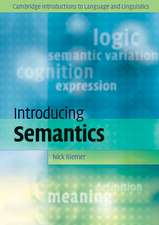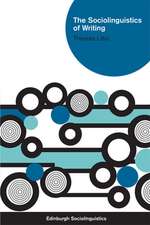Motives for Language Change
Editat de Raymond Hickeyen Limba Engleză Paperback – 3 mar 2010
| Toate formatele și edițiile | Preț | Express |
|---|---|---|
| Paperback (1) | 324.91 lei 6-8 săpt. | |
| Cambridge University Press – 3 mar 2010 | 324.91 lei 6-8 săpt. | |
| Hardback (1) | 727.91 lei 6-8 săpt. | |
| Cambridge University Press – 15 ian 2003 | 727.91 lei 6-8 săpt. |
Preț: 324.91 lei
Nou
Puncte Express: 487
Preț estimativ în valută:
62.17€ • 65.14$ • 51.40£
62.17€ • 65.14$ • 51.40£
Carte tipărită la comandă
Livrare economică 11-25 aprilie
Preluare comenzi: 021 569.72.76
Specificații
ISBN-13: 9780521135245
ISBN-10: 0521135249
Pagini: 300
Ilustrații: 1
Dimensiuni: 152 x 229 x 17 mm
Greutate: 0.44 kg
Editura: Cambridge University Press
Colecția Cambridge University Press
Locul publicării:Cambridge, United Kingdom
ISBN-10: 0521135249
Pagini: 300
Ilustrații: 1
Dimensiuni: 152 x 229 x 17 mm
Greutate: 0.44 kg
Editura: Cambridge University Press
Colecția Cambridge University Press
Locul publicării:Cambridge, United Kingdom
Cuprins
Introduction Raymond Hickey; Part I. The Phenomenon of Language Change: 1. On change in 'E-language' Peter Matthews; 2. Formal and functional motivation for language change Frederick J. Newmeyer; Part II. Linguistic Models and Language Change: 3. Metaphors, models and language change Jean Aitchison; 4. Log(ist)ic and simplistic S-curves David Denison; 5. Regular suppletion Richard Hogg; 6. On not explaining language change: optimality theory and the Great Vowel Shift April McMahon; Part III. Grammaticalization: 7. Grammaticalization: cause or effect? David Lightfoot; 8. From subjectification to intersubjectification Elizabeth Traugott; Part IV. The Social Context for Language Change: 9. On the role of the speaker in language change James Milroy; Part V. Contact-based Explanations: 10. The quest for the most 'parsimonious' explanations: endogeny vs. contact revisited Markku Filppula; 11. Diagnosing prehistoric language contact Malcolm Ross; 12. The ingenerate motivation of sound change Gregory K. Iverson and Joseph C. Salmons; 13. How do dialects get the features they have? On the process of new dialect formation Raymond Hickey; Part VI. The Typological Perspective: 14. Reconstruction, typology, and reality Bernard Comrie; 15. Reanalysis and typological change Raymond Hickey.
Recenzii
Review of the hardback: 'Apart from providing pleasant reading for older scholars, this well-edited volume contains a great deal of material that can be used in advanced studies and researcher training in historical linguistics.' Journal of Sociolinguistics
Review of the hardback: ' … the papers are of uniformly high quality, and some of them are absolutely first-rate. A number of the contributions are also eminently suitable for use in advanced courses on historical linguistics. This book is a worthy tribute to a distinguished scholar.' CJL/RCL
Review of the hardback: ' … the papers are of uniformly high quality, and some of them are absolutely first-rate. A number of the contributions are also eminently suitable for use in advanced courses on historical linguistics. This book is a worthy tribute to a distinguished scholar.' CJL/RCL
Descriere
This book considers the processes involved in language change and how they can be modelled and studied.
















